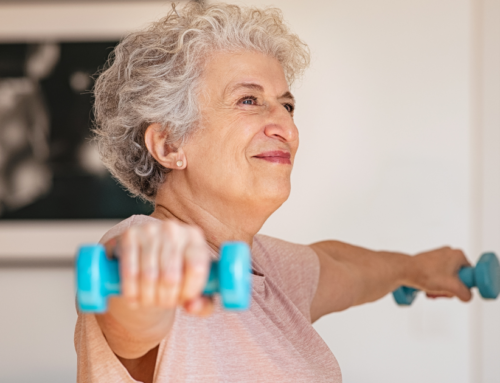Whether or not we’re currently living an active lifestyle, any age is never too old to begin an exercise habit. Too many people associate exercise and physical activity with the young and looking good. This isn’t the case! And it’s not just for the under 65 set.
Late-in-life benefits of exercise
We all know that as we age, our bodies change. Among other things, we start to lose:
- Bone density – After that age of 40, bones start to become thinner and weaker
- Aerobic capability – Aging in general makes it tougher on the heart to deliver oxygen through the body
- Overall flexibility – As we age, we can start to limit our activity and by doing this, along with the simple process of aging, our tendons and joints can lose some of their mobility
- Muscle mass – Believe it or not, after the age of 20, we start to lose muscle mass and it becomes harder to build and retain muscle
WebMD works to uncover some of myths about aging in this article:
“There’s a powerful myth that getting older means getting decrepit. It’s not true. Some people in their 70s, 80s, and 90s are out there running marathons and becoming body-builders. A lot of the symptoms that we associate with old age — such as weakness and loss of balance — are actually symptoms of inactivity, not age, says Alicia I. Arbaje, MD, MPH, assistant professor of Geriatrics and Gerontology at Johns Hopkins University School of Medicine in Baltimore.”
- Benefits of exercise (regardless of what age one starts):
- Boosts immunity
- Can increase bone density
- Can help to prevent chronic disease
- Relieves osteoarthritic pain
- Has been proven to help fight against depression and increase overall mental health
So, how do I get started?
Get the go ahead from your doctor or main healthcare professional. Speak with your doctor about any ongoing issues or conditions you have. Let them know that you want to start a regular exercise routine and ask them what would be best for you.
Determine what kinds of exercising you want to incorporate into your life. Once your doctor gives you some ideas, perhaps even including local clubs, gyms or community centers that have programs for senior citizens, you’ll have a better idea on what you’d like to start enjoying. Activities could include:
- Swimming
- Yoga
- Walking, indoors or outdoors
- Aerobic exercise (water aerobics, chair aerobics, dancing, etc.)
- Strength training (weights…and no, they aren’t just for “young” people)
Start slow, but try to be consistent. When we were younger, it was easy to go gangbusters on something new. Not only do we maybe not have the same energy that we used to have, but even when we were younger, we’d go all out, then sputter to nothing a week or two later. Beginning slowly, perhaps even starting out just twice a week will help to avoid burnout and will build consistency that is best for our overall health.
Track and measure. If you’re walking, use a pedometer. If you’re going to swim, count “laps”. If you dance or take an aerobics class, record how long. Some of the most positive benefits of exercise come to us with measured consistency, and we want to build a habit that will last us the rest of our lives.
Commit – Stick to it. Don’t burn out by going all-or-nothing too quickly. The key is to slowly incorporate a lifelong habit; one that you’ll not only enjoy, but that is good for you too!
Wrap Up
Building a new habit takes time and patience with ourselves, including the habit to add exercise into our lives. Get committed, start slow and don’t forget to speak with your doctor before starting any new exercise routine.
~ ~ ~
Do you have questions about how you can better support your loved one while they age in place in South Florida or regarding homecare in general? Please contact CareGivers of America here: Contact or call us toll free: 800-342-4197
To join our amazing mailing list where you’ll receive special content, click here.
*No information in this article is to be taken as advice, medical or otherwise. This post is not sponsored, but may contain external links to websites, articles or product examples. External links are used for example or reference purposes only and these links do not indicate specific product or website endorsement by CareGivers of America.


